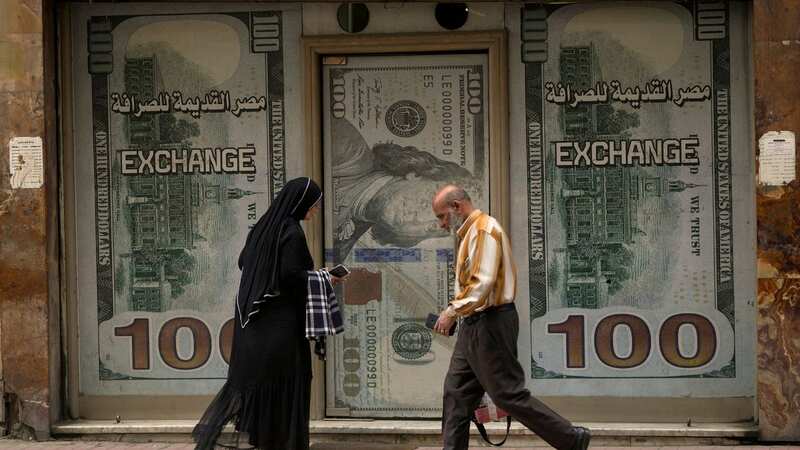Egypt floats currency and agrees with IMF to increase bailout loan to $8bn

Egypt has decided to float its currency and has agreed with the International Monetary Fund (IMF) to increase its bailout loan to $8 billion (£6.8 billion).
This move is aimed at strengthening an economy that's been hit by a severe shortage of foreign currency and skyrocketing inflation. The decision to float the Egyptian pound, along with a significant increase in the main interest rate, is designed to fight inflation and attract foreign investment.
These steps were announced by the Central Bank of Egypt early on Wednesday and were key demands of the IMF for increasing its $3 billion (£2.5 billion) bailout loan, which both parties agreed to in 2022. The central bank, also known as CBE, raised the key interest rate by 600 basis points to 27.75%.
After the announcement, the pound started floating and lost more than 60% of its value against the dollar within hours. By the end of the day, commercial banks were trading the U.S. currency at over 50 pounds for $1, up from about 31 pounds.
The value of a floating currency is determined daily by traders in global markets, rather than by government policies. In this way, a floating currency imposes discipline: Investors tend to buy the currency of a nation with sensible economic policies, which drives up its value.
 Shop prices 'are yet to peak and will remain high' as inflation hits new heights
Shop prices 'are yet to peak and will remain high' as inflation hits new heights
On the other hand, if a country's economy is not managed well, its currency usually isn't wanted much, which keeps its value low. Countries that spend too much money they don't have or print lots of money and cause prices to go up can be punished by the market.
When a government sets the price of its money too high compared to what people think it's worth, black markets can start, like what happened in Egypt. Egypt's economy has had a tough time because of government spending cuts, the coronavirus pandemic, problems from Russia's big attack on Ukraine, and the recent fighting between Israel and Hamas in Gaza.
Attacks by the Houthi group on ships in the Red Sea have cut down the money Egypt gets from the Suez Canal, which is important for getting money from other countries. These attacks made ships go around Africa instead of through the canal.
The war in Ukraine shook up the whole world's economy and hit Egypt's wallet hard. Egypt is the country with the most people in the Arab world and it needs to buy a lot of its food from other places, especially wheat, to feed more than 104 million people.
The Central Bank of Egypt (CBE) said that the steps it took on Wednesday would help stop the black market for money and slow down inflation, which has gone up a lot recently. In January, the rate of inflation for a year was over 31%, based on official numbers.
"The CBE will continue to target inflation as its nominal anchor, allowing the exchange rate to be determined by market forces," said the central bank.
The authorities also confirmed that the Central Bank of Egypt (CBE) has secured funds for market needs, suggesting that they expect the exchange rate to stabilise. "We have sufficient foreign currency to cover our obligations, particularly after the unification of the exchange rate," central bank Gov. Hassan Abdalla stated at a news conference.
He added that the CBE will focus on reducing double-digit inflation. "We will not hesitate to take any measures to fight inflation," he said.
Read more similar news:
Comments:
comments powered by Disqus

































